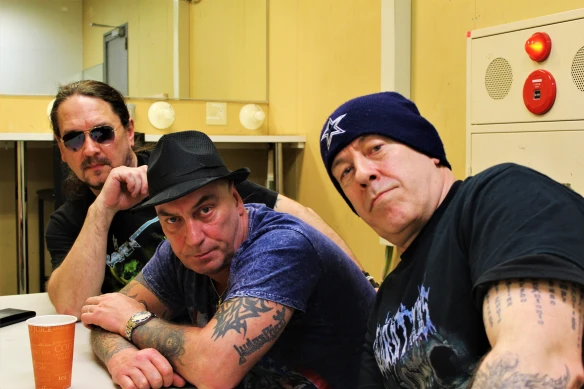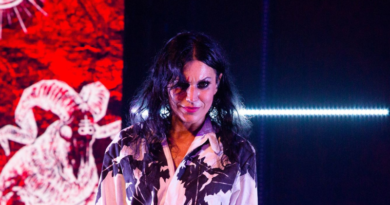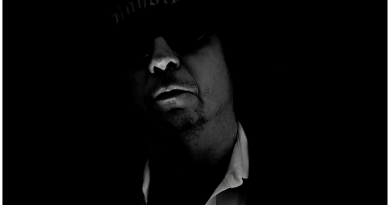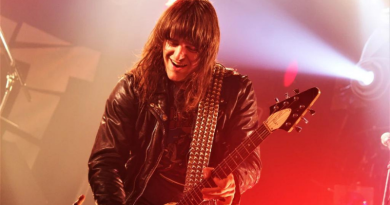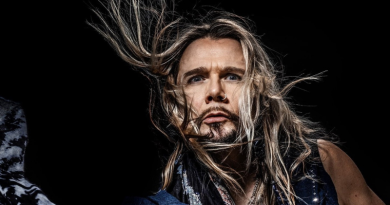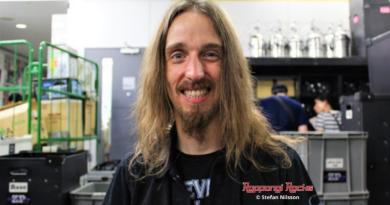Interview | Venom Inc: “We can only be who we are”
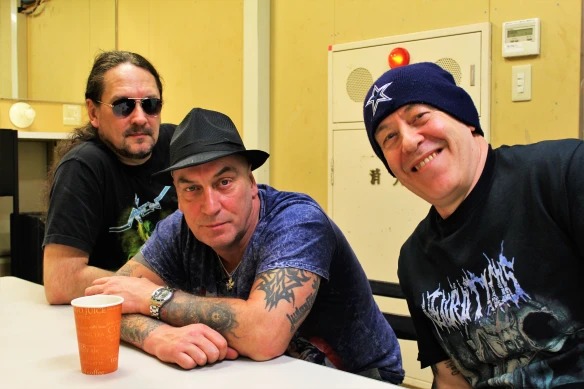
Venom Inc talks to Roppongi Rocks about an unplanned reunion, being cheeky, writing very long songs and staying relevant.
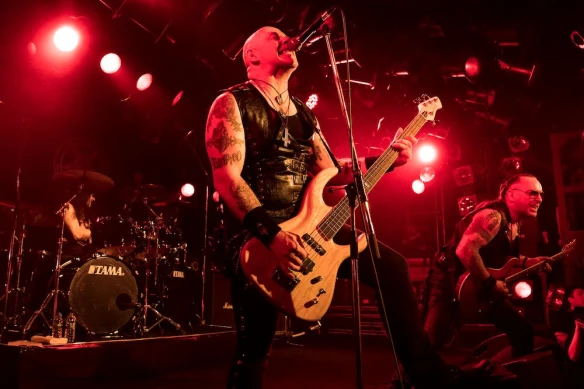
What a comeback! When the classic “Prime Evil” era line-up of Venom – Tony “Abaddon” Bray, Jeff “Mantas” Dunn and Tony “The Demolition Man” Dolan – reunited as Venom Inc a few years ago, I think many people saw it as a fun and nostalgic thing. Venom was founded 40 years ago in Newcastle in the north of England. It not only pioneered extreme metal, the whole black metal sub-genre was named after its second album. In August last year Venom Inc released the fantastic album “Avé” on Nuclear Blast internationally and Ward Records in Japan. It was one of 2017’s best albums and it became obvious that Venom Inc is much more than just a reunion and a celebration of the past. Venom Inc links the past, the present and the future. When Venom Inc recently returned to Japan for a second tour, I sat down with the band backstage before their Tokyo gig.
While a bleak Cronos-led version of Venom has been out there playing shows, the proper legacy of the band seemed to have died. But then guitarist Mantas and vocalist and bassist Dolan reunited in 2010 in the band M:Pire of Evil and that was the beginning of something which in 2015 led to a proper reunion of a vital Venom under the name Venom Inc.
“It was always a good version of the band,” says drummer Abaddon. “It wasn’t a short stint of the band. People tend to forget about that a little bit. Good albums, some good tours. We went to some places we hadn’t been to before. So, it was a good thing to reunite, it wasn’t a ‘let’s get some random guy back in the band and hope it works out’. It was a good version of the band to start building from. But it wasn’t meant to be a band. It was just meant to be a one-off thing for a festival in Germany. It was meant to be these guys playing as M:Pire of Evil and I was going to join for five songs, six songs.” Dolan adds: “Just to go ‘Surprise! There you go’.”
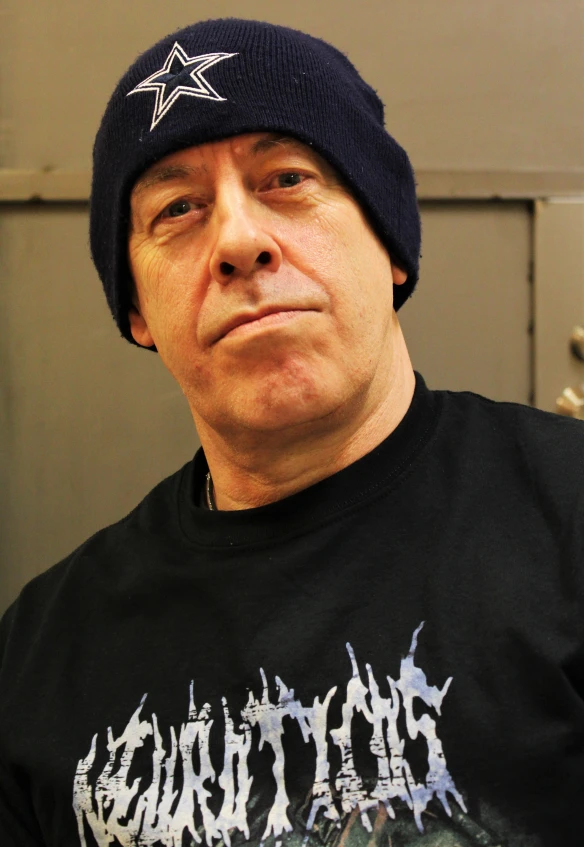
Abaddon continues the story: “There were a lot of…I guess what you call hardcore Venom fans there anyway. It’s very central to where a lot of people live, handy for the French people, the Swiss people and obviously the Germans. So it was always going to be a hardcore group of people there. This just kind of added a bit of spice on that cake and it made it a bit more exciting for them. Right from the beginning, right from the first chords of the first song we played, you’re getting this wave happening… You only really get that with some of the bigger bands, like when Deep Purple getting someone back in or Black Sabbath getting Ozzy back in and you get that really big wave.”
“It felt unusual, not regular,” says Dolan and continues: “Not just another band. Even the signing. There was 20 minutes allotted for the signing and after like 35 minutes they were going: ‘You know you guys can stop now’. But there was still a line. I mean there was over a thousand people, I swear to God, lining the hall while the bands were still playing. And I said: ‘But there is all them.’ It was crazy. At 50 minutes they went: ‘Look, I think you guys should probably just…’ and I said: ‘Well, when they’re finished, if we can get to every fan.’ There were other bands signing their things and leaving and we were still there. That’s just how it is.”
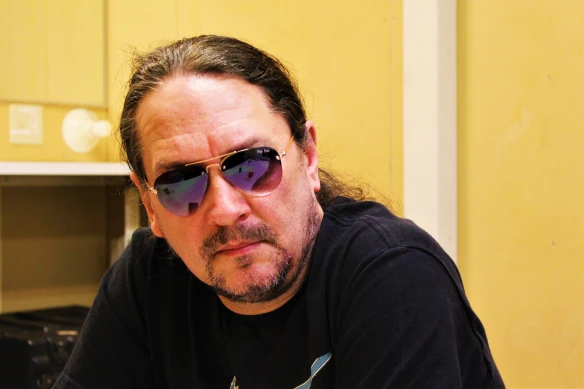
What prompted the reunion of the “Prime Evil” era line-up? “There is a festival in our hometown Newcastle,” explains Abaddon. “Tony’s band Atomkraft was playing and he spoke to Jeff about getting to do some old tune in a very similar sort of way but in our hometown. I was there just watching what was going on as a fan of the music. I had been there maybe a couple of years in a row. I’m standing at the bar and a couple of these big German guys with ‘Black Metal’ on their backs, they turned and looked at me when these guys were on stage.”
As Mantas appeared on stage next to his old Venom bandmate Dolan, the Germans looked at Abaddon in the audience and said: “What the fuck! Why aren’t you doing this?” Abaddon was taken by surprise: “I was like: ‘I don’t know.’ It turned out that one of them was the promoter of the show. He does a few big festivals. The one in Newcastle I think was in February and the one these guys were going to do in Germany was in April, so it was a kind of a natural. ‘If I can make this happen, would you be up for it?’ Like I said it was ever meant to be that quick couple of songs.”
After the Newcastle festival the promoter approached Dolan: “He literally after the festival said: ‘That was really great to see all that and you got Mantas up and that was brilliant. Why don’t you get Abaddon and do some Venom stuff?’ and I was like: ‘Well, it wasn’t that kind of thing and I don’t know if that could happen’.” The promoter pushed on and got Abaddon to agree to turn up at the festival in Germany after being promised flights, a nice hotel and a bottle of whisky. “It was quite a shock. We all just had a giggle,” says Dolan about the one-off festival reunion in Germany. But by the next morning, says Dolan, “We had two or three management offers, we had four or five promoters worldwide go: ‘When can we book the band?’ We’re not a band, we just did that. ‘No, no, you guys should do this’.” Abaddon adds: “We got an offer for a live album, an offer for an album.” Dolan continues: “So we just said: Why not? But the misnomer is that we went out there to cash in and play the catalogue. It kind of wasn’t like that. We agreed to do a lot of stuff so the first thing was to go: ‘What would people like to hear?’ And they wanted to hear every single song that’s ever been done!” Abaddon adds: “Funny enough one of the first places we came to was Japan. We went to China and then Japan. The Japanese were some of the first people that saw this.”

Since the initial touring after the reunion, the band then went into the studio and created nothing short of a masterpiece. A new album with new terrific music. Did the band members know that they had such great new material in them? “There was no plan,” says Abaddon and Dolan adds: “No plan to do anything. We just went: ‘OK’. To make it legitimate, I personally felt we should go back to the first single and then come as fast through the catalogue of Venom because it’s such great songs that lots of people hadn’t actually heard. They never got a chance to see the band. Make our way right through to where we are.”
Abaddon continues to explain: “Me and Jeff were founding members of the band but Tony is a fan of the band. I think it’s fair for me and Jeff to say that we’re not particular fans of Venom’s music. You can enjoy playing it and enjoy writing it and enjoy taking it out on the road, but would I have bought ‘Black Metal’? I would have bought ‘Prime Evil’ after I heard it, but I don’t think I would’ve then gone back to the back catalogue necessarily. But to have somebody in the band who is a fan of the band and who gets the band, knows about the songs.” Dolan originally joined Venom as a replacement for Cronos in the late 1980s.

Venom has a proud legacy with some classic songs, but the new Venom Inc album beats the whole back catalogue. “That’s a big thing to say. That means a lot,” says Abaddon. “The one thing that we discovered,” explains Dolan, “because I didn’t want to go towards an album, I really didn’t. The live album, we talked about it, people were asking about it. A live album though? Maybe later once we’ve done… But there’s no new music. Do you want to give that to the fans? The same songs but just in a different configuration. Is that not boring? But there are collectors and they want it. An album brings a whole load of stress. I don’t want to get into politics anymore. I don’t want to do that. And then selling it to who and getting the best deal and publishing… You think: ‘Oh my God!’ We were having so much fun just playing the music to fans who wanted to hear particular songs. That’s what I want to be able to do, to just play the music that is there. With the way we feel, there’s something special with it. The first three of them had something and we have something. I don’t know what it is, it’s just something. Let’s just have fun with this. We’re too old to get into all that bollocks again. But, they kept pushing, they kept pushing, they kept pushing. So it was like: ‘Well, what is the best thing about us? Apart from we’re good-looking of course, we’re sexy, we smell pretty good’. If we’re going to do it, how do we take who we are in a live situation and put that on an album without it being a live album?”
Abaddon continues: “The big thing that is different, I suppose, now is social media. The way that bands are perceived, the way bands can build something or change something. It’s different now. We didn’t grow up with that. We grew up with tape trading and phone calls and word of mouth. We weren’t very good players. The interest in the band grew outside of how good we were and what we did. We relied a little bit on… You learn all this with hindsight. We were allowed to grow into what we were supposed to be. By the time we got the band there, when Tony came in, we could actually play a little bit and we knew a bit about what we were supposed to be about. Don’t forget that it was fucking five, six albums in or something! You know bands have that tricky third album? We had to go to six before we could put a good record out!”
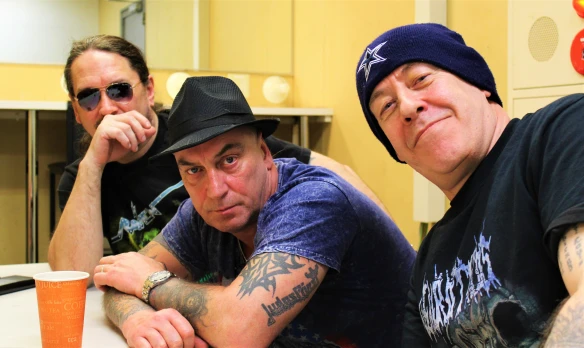
While working on the new album, did the band feel any constraints to fit in with the Venom legacy? “When Jeff was composing this stuff, he’s constantly writing stuff,” says Dolan. “He was sending things through that I had to be thinking about vocally. I see music in images. When I hear the piece, I see whatever it is. If I don’t see anything then it needs something else. I don’t know what it is. But, OK, we’ll think about that. But if I see it, there it is. Anything sent through I kind of saw.”
“I think that the one thing that we all kind of agreed on, how the album came together and how it was done, was that we weren’t gonna go back and say: what made ‘Bloodlust’ good? Let’s do another one!” says Abaddon and Dolan adds: “No plagiarism!”
Abaddon continues: “I think that’s fair to say, we all thought: Right! ‘Witching Hour’ was great. People love ‘Witching Hour’. Let’s do another one! That was never gonna happen. Whether it was going to sound sonically like ‘Black Metal’ or whatever, or played like ‘Prime Evil’, it was never gonna be: ‘Just take that because it worked’. That was never gonna happen!” Dolan adds: “Not on purpose. That was the key. Jeff was like: ‘Do you think I am going in the right direction?’ I went, this is the direction you need to go in: You were Jeff Mantas, you are Jeff Mantas and you will always be Jeff Mantas. And I and Tony are the same. That’s what we need to record. Us! You don’t have to be that guy, you don’t have to be anybody! We don’t have to try and be that other thing. We just have to be us, the way we are. That’s what’s working and that’s what should happen. For me I think that’s what happened. It’s honest because that’s who we are. When we play the tracks live, people have been saying the same thing. When we play the new tracks, on one of the shows we did not so long ago, a festival show, I’m singing ‘Avé’ and when I was singing the chorus it sounded funny. Something weird happening. I’m getting some kind of weird reverb. And then I realised, the audience were all singing it! They were all singing it back. Wow! It was amazing to do those new tracks. That was always a Venom thing, when people would be singing the lyrics as loud as they could while we’re doing it. That’s a testament I think. But that comes from the other thing: plagiarism would have been death to us. Trying to be something we aren’t. We can only be who we are. That’s what works!”
The cheeky side of the Venom Inc boys is always present which is evident when we discuss how much of the new material the band now typically plays in the current set list. “Eh… Jeff plays all of it, I play some of it,” says Dolan with a big smile across his face. Abaddon continues: “I play about two-thirds of it. Hahaha!!” And the banter goes on: “So, it depends on where you are in the audience. Haha!!” laughs Dolan and Abaddon adds: “If they’re at the back it’s a right fucking mess!”

On a more serious note, Abaddon explains: “It kind of depends on how long the sets are. You have to give a crowd-pleasing performance. As people want us to play the new stuff anyway, so it’s a kind of give and take and find what fits. There are certain songs on the new album that fit well in with a classic set. One of the things I used to love about band, the bands I was into, would change up songs when they played live. One of the big things that we’ve done, there are no actual changes in the song, in parts of the song, but the way we play parts, is ‘Warhead’. We used to play ‘Warhead’ all the time, you know with the other guy and it was always good and it was heavy. It was great. But somehow it’s become this thing which is central to the set, almost every night. It’s like you just get into a fucking groove and it really becomes massive. It’s a great song, there is nothing wrong with the song. We played it pretty much every time we played but it was always just a song.”
Dolan continues: “‘Sons of Satan’, it’s kind of become an anthem for the fans and us. When we play it, it’s like the punkiest punch in the face you’re ever gonna get. And it means something now. Before it was just another song, but it means something now. Like ‘Warhead’, stuff like that. We play with it. We want to put the new stuff in, but was is amazing is that a song you may have composed forty years after that song and we put them back to back and they sound like they could…all of the songs from ‘Live Like An Angel’, the B-side of the first single, to ‘War’ or ‘Bloodlust’ in the middle, they could all be on the same album. That’s amazing to have stuff like that. That shows great songs. That’s always something I’ve said about the legacy. Most bands might go out… If you went to see Europe, tell me five Europe songs! ‘The Final Countdown’…” Abaddon adds: “Ha! I couldn’t tell you two!” before Dolan makes his point: “’The Final Countdown’! Now if you went to see Europe and they didn’t play ‘The Final Countdown’, you’d be going: ‘Ah, I’m gutted!’ To be in a band where you have got more than one and you’ve got ten and we could play 30 songs over two hours, three hours and still people go: ‘You didn’t play my favourite song! Why didn’t you play that one?’ That’s that richness of the legacy and that’s what is really special about this and really wonderful. Every night is a different night. We have that flexibility because of experience and because of everything else. Each night is not the same night. A thousand years ago, if you came to see the first night of a 30-date tour, the guys on the last night didn’t know what was gonna happen. The reviews wouldn’t be coming out until later. They might see a photograph, but rarely. They might have had a friend who went to the show. These days, before we finish the set, everybody on the last date already knows because they have taken photographs of the set list, there’s video up. In a way it’s kind of like a spoiler to a movie. I’m dying to see this movie and then someone post it and tells you everything about it. No! So I’m trying to encourage people to wait a little bit so that people can enjoy that. But because of that it means that we have that movement so we don’t give you the same show. In Osaka it won’t be the same show as tonight so that people can feel it’s special.”
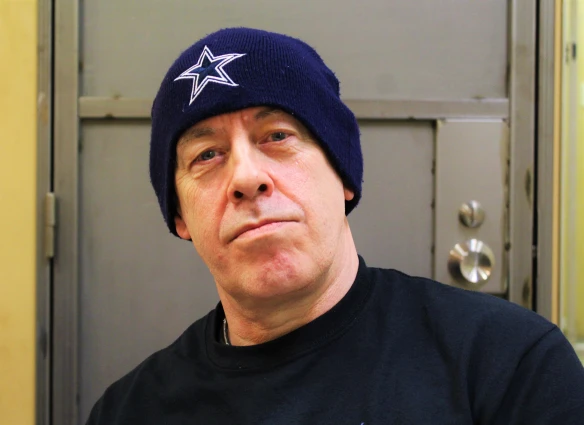
On the new “Avé” album there are some very long songs. Mantas, the main songwriter, explains: “There’s a couple of songs I actually had to strip back. They were even longer. ‘Forged in Hell’ was about a minute longer than it is on the album. I was listening to it and it was just… When I’m writing, I am all about hook lines and choruses and where can the audiences join in? And this particular song, to me it seemed it was taking too long to get to the ‘Forged in Hell’! It was taking too long to get to that, so it was about a minute cut out of that.” Dolan adds a cheeky: “And then you gave yourself a good talking to, didn’t you?” Mantas continues: “I did. But a track like ‘Avé’, that comes in at… even ‘Dein Fleisch’, that comes in at seven minutes. But the thing is, when I construct the songs, when I am listening back to them, the first time I have a song fully constructed, I press play and the stop watch and I see what it comes in at. Then once I have got all the parts together and it’s still the same length, even without vocals, if it’s not doing it without vocals, because the vocals are the key on every song. That’s it, that’s the storyline for it. But as an instrumental piece, if I’m sitting there going: ‘For fuck’s sake! Fucking hell, when is it going to end?’ But with both ‘Dein Fleisch’ and with ‘Avé’ and with ‘Blood Stained’ as well, it was like I didn’t notice that because I felt the arrangements and the parts were keeping the attention. Then I thought: once the vocals go on top and the story’s told, then you’re not gonna notice. Seven minutes is going to pass like that. We had to do an edit for ‘Dein Fleisch’ for some strip clubs in America. They wanted a three and half, four minute edit for pole dancers. So, I did that and then listening back to it, it actually sounded weird. It was ending too soon.”
“The thing about radio play,” explains Dolan, “‘Dein Fleisch’ was on radio constantly in America. Nobody was going: ‘It’s a bit long, isn’t it?’ They were just playing it. If it works, it just works and people don’t notice the length of it.” Mantas continues: “Purposely, that’s why the album ends with ‘Black N Roll’. Because you’re getting commentary on world, fucking shit that’s going on and you’re getting the usual stuff from Venom, you’re getting the song about metal and the fans and all that kind of stuff. And it is a pretty dark album at times. Some of the songs are long and then it just needed a good punch in the face to finish it off! With a bit of humour which we have always been known for. It was a tribute to everything we love really.”
Dolan makes a point about the cheekiness of the band: “I think that’s a highly important point as well. That humour thing is something – we always had that cheeky humour thing. Venom always had that. I think it lost itself somewhere. That is part of whole thing. To me having that cheeky side back in there, I guess was important. It’s part of the identity.”
Well, folks, the Venom Inc boys are here. They have a past, present and future together. They’re relevant and they’re better than ever before. Shortly after our chat they walk on stage and deliver a devastatingly terrific metal show. Metal we bleed indeed.
